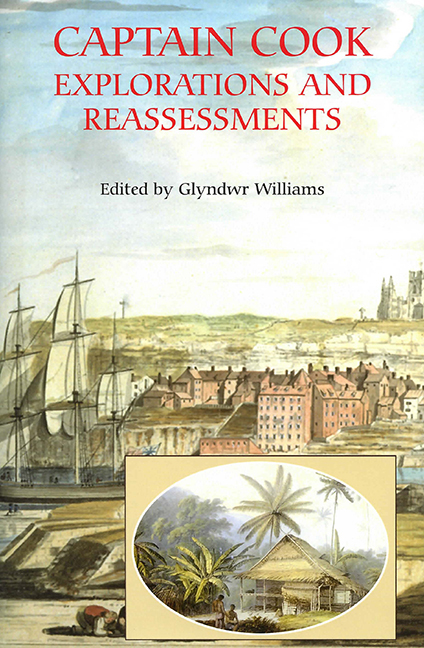Book contents
- Frontmatter
- Contents
- List of illustrations
- Contributors
- Acknowledgements
- Abbreviations
- Introduction
- Part I The Years in England
- 1 Cook's nursery: Whitby's eighteenth-century merchant fleet
- 2 ‘Remember me to my good friend Captain Walker’: James Cook and the North Yorkshire Quakers
- 3 James Cook and the Royal Society
- Part II The Pacific Voyages
- Part III Captain Cook and his Contemporaries
- Part IV The Legacy of Captain Cook
- Index
3 - James Cook and the Royal Society
from Part I - The Years in England
Published online by Cambridge University Press: 25 October 2017
- Frontmatter
- Contents
- List of illustrations
- Contributors
- Acknowledgements
- Abbreviations
- Introduction
- Part I The Years in England
- 1 Cook's nursery: Whitby's eighteenth-century merchant fleet
- 2 ‘Remember me to my good friend Captain Walker’: James Cook and the North Yorkshire Quakers
- 3 James Cook and the Royal Society
- Part II The Pacific Voyages
- Part III Captain Cook and his Contemporaries
- Part IV The Legacy of Captain Cook
- Index
Summary
The standard view of James Cook's three voyages of exploration embraces the idea that the Royal Society was a thoroughly involved participant in their preparation, execution and results. Because, perhaps, of his early death, the status and fame which James Cook achieved by the time of his third voyage and posthumously, have been casually transferred by many writers back to the time of his selection in 1768 for naval promotion from master to lieutenant and command of the converted Earl of Pembroke. Cook had no later life for historians to plot the rise and rise of his career into old age. Joseph Banks has been more tenderly treated: certainly there have been writers who have similarly attached the eminence of the older Sir Joseph to the opportunist venture of the young naturalist in applying in 1768, through the Royal Society of which he was a new Fellow, to government for permission to accompany the Transit of Venus expedition. But biographers of Banks, more perhaps than those of Cook, have managed to put their central character's early activities into perspective.
Cook's first voyage was properly the Royal Society's expedition: the initiative and the planning for observing the Transit of Venus in the southern hemisphere came from the Royal Society. It was the government agenda for exploration which took charge of the expedition once the Transit of Venus observations at Tahiti were completed in 1769, even though many of the subsequent discoveries later came to be interpreted to the public through Banks's position in the Royal Society. Chroniclers of the Royal Society have suggested (or assumed) that the Society, as an institution, was similarly central to the planning and results of Cook's second and third voyages. But this is by no means certain. The interests of the Royal Society and the mechanisms by which it operated in the later mid-eighteenth century have yet to be put properly under the microscope of Cook studies.
Four lines of enquiry suggest themselves. What was James Cook's involvement in the Royal Society's preparations in 1767 and 1768 for the Transit of Venus expedition? What was the Royal Society's involvement in the planning of Cook's second and third voyages? What reception did the Royal Society give to James Cook on his return from his first and second voyages? And how did the Royal Society receive the news of Cook's death in 1780?
- Type
- Chapter
- Information
- Captain CookExplorations and Reassessments, pp. 37 - 56Publisher: Boydell & BrewerPrint publication year: 2004

